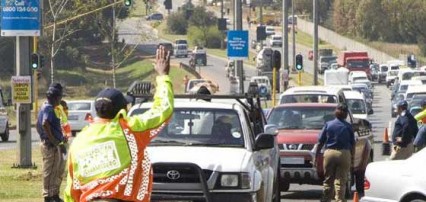Apartheid-era laws are alive and well on our roads
The apartheid "dompas" and police abuse are alive and well in Johannesburg. One of the most heinous aspects of the apartheid crime against humanity was that innocent blacks were stopped and required to produce a pass, pass book or "dompas". Twenty years later, little has changed, writes Leon Louw of the Free Market Foundation in Business Day.

She disappeared for a time. When she returned, she was brandishing a document which, she said, indicated that there was a warrant for Lesley’s arrest. It could be waived, she said, if he paid R500. Like apartheid dompas victims of the past, Lesley’s reaction was incredulity and bewilderment. He did not own a vehicle and had never had notice of a fine. He had no cash and showed his empty wallet. She saw his debit card and said "Use that", to which, he replied, "There’s no money in it."
In an attempt to assist, I intervened. As I searched for whoever was in charge, I examined the incoherent document printed at the JMPD’s motorised "workstation". It is headed "Query Infringement" and is simultaneously "page 5 of 11"and "infringement confirmation page 1 of 2". It gets worse. The "infringement notice 010011003224252" makes no mention of Lesley’s name or the registration of his taxi. Nor does it mention a fine or warrant of arrest. It mentions a 2012 "penalty/discount" of R500 and describes the "next possible status" as a "courtesy letter".
The "person in charge", when found, conceded the absence of a fine or warrant of arrest and released Lesley. But we wanted her to confront the officer. In an officious manner, she dispatched Lesley to fetch the officer who proceeded to deny what had happened. The senior seemed unsurprised and unperturbed by the apparent revelation of extortion, fraud, corruption and/or abuse under her nose.
Details were e-mailed to JMPD chief Zwelibanzi Nyanda. Many attempts to contact him failed. Independently, the Law Review Project has obtained legal opinion on whether stopping innocent people randomly is lawful in post-apartheid SA and is considering a constitutional challenge to put an end to offensive and legally dubious roadblocks. Most victims capitulate; few complain.
The dompas system, but not the principle of police harassing innocent people, has been sanitised by extension to whites.
It is enforced against motorists at roadblocks instead of pedestrians on the pavement, it parades as traffic control instead of group area enforcement, it involves hordes of police and vehicles instead of a few, and creates congestion instead of inconvenience.
Modern victims must produce driver’s licences instead of dompases, and registered vehicles instead of section 10 houses. JMPD’s insatiable appetite for roadblocks causes more disruption, congestion and delay, and extracts or extorts more money, than its apartheid mentors achieved at their nadir. JMPD roadblocks aggravate rather than improve road conditions. And at least one (at the Johannesburg end of the airport freeway last Thursday) appears to have been an orchestrated scam possibly involving multiple JMPD police in extortion or worse.
This column reported how a young woman narrowly escaped being robbed and raped by police last year. A deluge of media and internet reports led to excellent civilian advice from the Automobile Association, 1st For Women, Arrive Alive, Assist 24/7, the Justice Project and others. Some point out, for instance, that cars do not commit crimes, so that offences connected with vehicles justify neither apprehending and penalising drivers, nor declining licence renewals.
The fundamental evil is not the detail they address, but the reincarnation of dompas apartheid in metro police uniforms.
• Louw is executive director of the Free Market Foundation.
View at source.
















